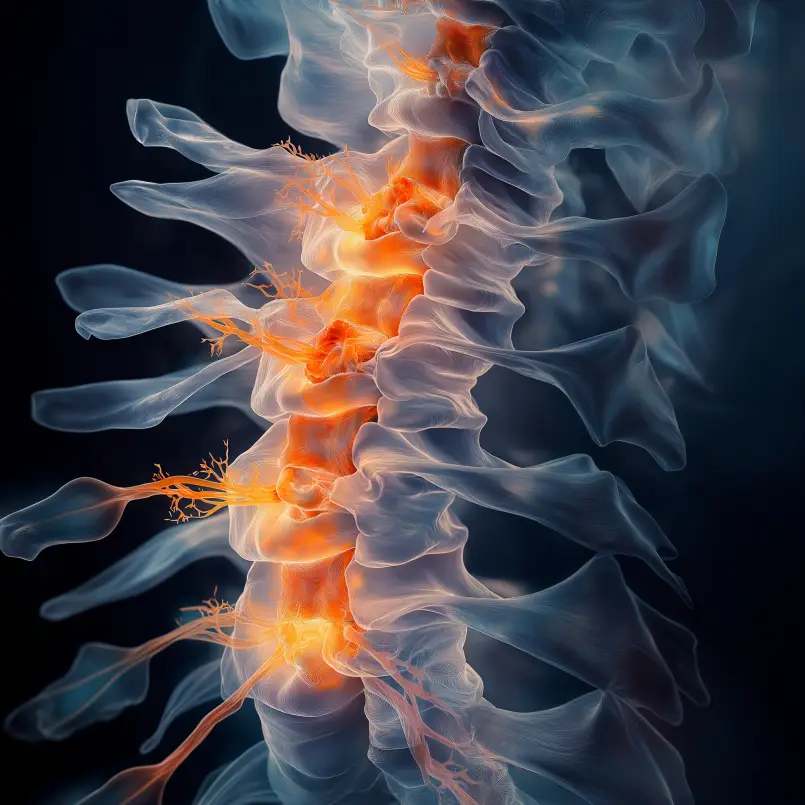Conditions
The Complete Guide to Pinched Nerves and Radiculopathy
Published: September 14, 2024
Author: Dr. Achillefs Ntranos MD

Are you experiencing persistent pain, numbness, or tingling sensations that radiate from your spine to your limbs? You might be dealing with a pinched nerve or radiculopathy. This comprehensive guide will help you understand these conditions, their causes, symptoms, and treatment options, as well as when to seek medical advice.
What Are Pinched Nerves and Radiculopathy?
A pinched nerve occurs when too much pressure is applied to a nerve by surrounding tissues, such as bones, cartilage, muscles, or tendons. Radiculopathy is a specific type of pinched nerve that affects the spinal nerve roots. This pressure can cause pain, tingling, numbness, or weakness in various parts of the body.
Did You Know?
Radiculopathy is often named based on the spinal region affected:
- Cervical radiculopathy: Compression of nerves in the neck
- Lumbar radiculopathy: Compression of nerves in the lower back
Common Causes of Pinched Nerves and Radiculopathy
Several factors can lead to nerve compression:
- Herniated discs
- Spinal stenosis
- Bone spurs
- Injuries
- Repetitive motions
- Poor posture
- Obesity
- Pregnancy
Symptoms of Pinched Nerves and Radiculopathy
The symptoms of a pinched nerve can vary depending on the location and severity of the compression. Common signs include:
- Sharp, aching, or burning pain
- Numbness or decreased sensation
- Tingling or "pins and needles" feeling
- Muscle weakness
- Muscle twitching and fasciculations
- Pain that radiates along the affected nerve's path
Radiculopathy symptoms often follow a specific pattern based on the affected spinal region:
- Cervical radiculopathy: Pain, numbness, or weakness in the neck, shoulders, arms, or hands
- Lumbar radiculopathy: Pain, numbness, or weakness in the lower back, hips, buttocks, legs, or feet
Diagnosis of Pinched Nerves and Radiculopathy
If you suspect you have a pinched nerve or radiculopathy, your healthcare provider will perform a thorough evaluation, which may include:
- Physical examination
- Medical history review
- Neurological tests
- Imaging studies, usually MRIs
- Electromyography (EMG) and nerve conduction studies
- Nerve Ultrasound
These tests help determine the location and severity of nerve compression, guiding appropriate treatment options.
Treatment Options for Pinched Nerves and Radiculopathy
Treatment for pinched nerves and radiculopathy aims to relieve pain, reduce inflammation, and restore normal nerve function. Options include:
Conservative Treatments
- Rest and activity modification
- Physical therapy and exercises
- Nonsteroidal anti-inflammatory drugs (NSAIDs)
- Ice and heat therapy
- Posture correction
Advanced Treatments
- Prescription medications (muscle relaxants, anticonvulsants)
- Steroid injections
- Spinal decompression therapy
- Acupuncture or chiropractic care
Surgical Interventions
In severe cases or when conservative treatments fail, surgery may be necessary. Surgical options include:
- Microdiscectomy
- Laminectomy
- Foraminotomy
- Artificial disc replacement
Prevention Strategies
To reduce your risk of developing pinched nerves or radiculopathy:
- Maintain good posture
- Practice proper lifting techniques
- Exercise regularly to strengthen core and back muscles
- Take breaks during repetitive activities
- Maintain a healthy weight
- Use ergonomic furniture and tools
When to Seek Medical Advice
Consult a healthcare provider if you experience:
- Persistent pain, numbness, or tingling lasting more than a few days
- Symptoms that worsen despite home care
- Weakness in the affected area
- Pain that interferes with daily activities or sleep
Red Flags: Seek Immediate Medical Attention
If you experience any of the following symptoms, which may indicate spinal cord compression or cauda equina syndrome:
- Sudden, severe back pain
- Loss of bladder or bowel control
- Numbness in the groin or inner thighs
- Progressive weakness in the legs
- Difficulty walking or standing
These symptoms require urgent medical evaluation to prevent permanent nerve damage.
Understanding pinched nerves and radiculopathy is crucial for early intervention and effective treatment. By recognizing the symptoms and seeking timely medical care, you can minimize discomfort and prevent long-term complications. Remember, our experienced neurologist is here to help you navigate your diagnosis and develop a personalized treatment plan tailored to your needs.
Ready To Take The Next Step?
Connect with our neurology expert to discuss your symptoms and explore treatment options.
About the Author
Dr. Achillefs Ntranos MD
Board-Certified Neurologist
Achilles Neurology Clinic
Dr. Achillefs Ntranos MD is a board-certified neurologist and MS specialist known for his thorough evaluations and compassionate approach. Originally from Greece, he trained at Johns Hopkins University and Mount Sinai Hospital before founding Achilles Neurology Clinic in Beverly Hills to deliver comprehensive, patient-centered neurological care. He specializes in MS, autoimmune neurology, neuropathy, headaches, and other neurological disorders, blending research-driven insights with personalized treatment plans.